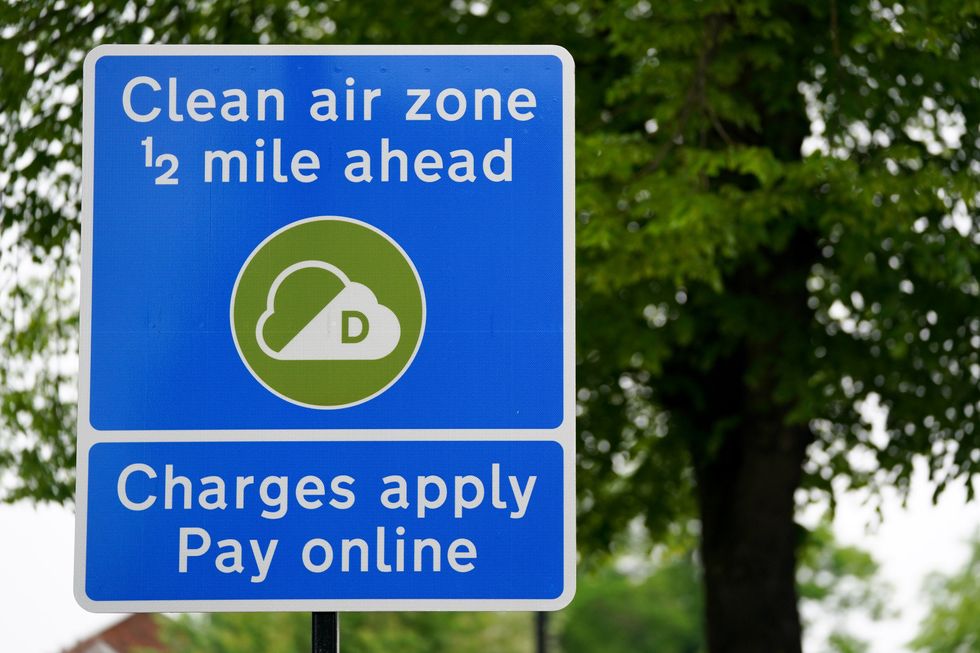Birmingham council issues 82 Clean Air Zone fines to itself after payment issue

Signs in Birmingham informing road users of the clean air zone initiative
Jacob King

Birmingham City Council has issued 82 fines against its own vehicles for non-payment of a new clean air levy, after an issue with its in-house payment system.
The Clean Air Zone (CAZ) came into existence in the city centre on June 14, with charges coming into force for vehicles from July 14.
In a question to the Labour-run council, the Conservative group – which opposed the CAZ’s introduction – asked how many penalty charge notices had been issued for local authority-operated vehicles.
Smoke is released from Birmingham Library to represent nitrogen oxides saved by the clean air zone launched in Birmingham.
Jacob King
Responding, the council said 82 such notices had been issued for its environmental services division, which includes its bin lorries, for non-payment of the zonal levy.
The council did not say how much the fine amounts would total but said the relevant department would foot the bill, with payments going to fund future sustainable transport projects, including a hydrogen bus pilot.
Vehicle operators have a 13-day payment window – the day of the journey and six days either side of the trip – in which to make payment.
The charge is £8 for a car, and £50 for a lorry, bus or coach entering the city centre, within the A4540 Middleway ring road.
Non-payment means a Penalty Charge Notice (PCN) is issued for £120, reduced to £60 if paid within 14 days.
On that basis, the totalled council vehicle fines amount could range from £4,920 to £9,840.
The city council said previously the CAZ was crucial to improving public health, with air pollution contributing to the premature deaths of up to 1,000 residents annually.
The council said it was in the process of replacing its existing fleet of 200 waste collection vehicles with CAZ compliant trucks, known as “greening” – with 76 already operating.
Taxis protested the city councils plans for a new clean air zone in Birmingham in 2019.
Aaron Chown
However, non-compliant trucks were still on the roads and were having to use a council depot within the zone, triggering charges.
The council said the non-payment issue for its vehicles arose because the daily charge for fleet vehicles could only be paid through a type of business credit payment card – known as a PCard (Purchase Card) – used by the local authority.
The council said: “The system can only take payment from a PCard.
“There was an initial delay in organising additional PCards and them being issued to local managers.”
The city council said penalty charges would now “reduce” because the system was “up and running”.
However, it added: “The director of city operations is now taking up this matter with the assistant director for highways and infrastructure.”
Conservative councillor Timothy Huxtable, the groups’ transport and environment spokesman, claimed the council was charging residents, “while ignoring the tax themselves”.
Responding, Labour’s Cllr John O’Shea, cabinet member for street scene and parks, said any claim the council was avoiding paying the charge was a “blatant untruth”.
Signs in Birmingham informing road users of the clean air zone initiative
Jacob King
He said: “Our garage facility for our refuse collection vehicles is situated inside the Clean Air Zone, so all vehicles will need to go inside it from time-to-time for maintenance and safety checks.
“We are currently investing in building two new depots outside the CAZ, including a new council maintenance and repair site.
“We’ve already moved a number of vehicles to depots that serve parts of the city outside the zone.
“But we are also delivering a cleaner fleet so all vehicles in the city meet the standards required inside the CAZ.
“The first tranche of new compliant vehicles have been on our streets since December 2020 and over the next few years the entire stock of wagons will be refreshed.
“When vehicles incur a CAZ charge, the council will be paying for this from the budget of the relevant service area.
“That has been something we have been clear on throughout the planning and preparation for the implementation of the zone and any suggestion we are avoiding the payment of charges when due is a blatant untruth.”